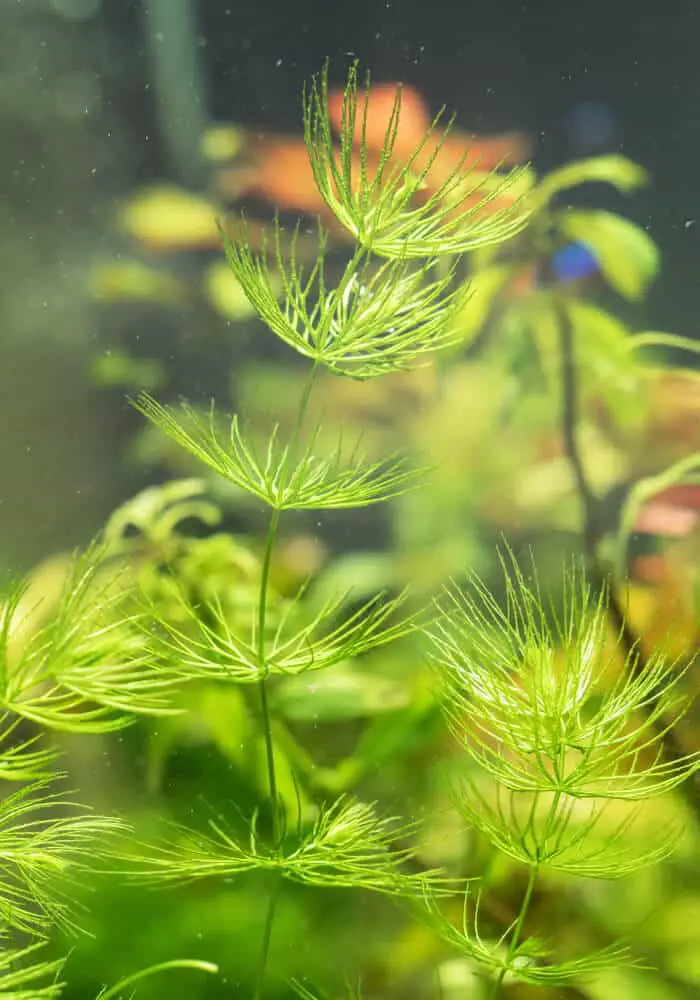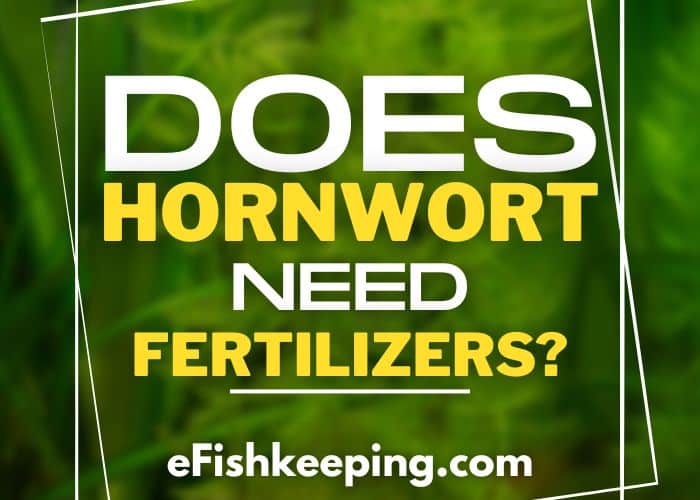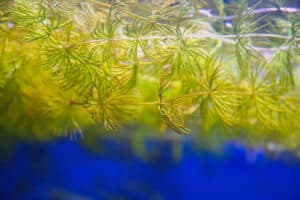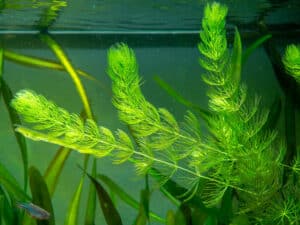Hornwort is a plant commonly found inside of aquariums. Also called coon’s tail, the plant has lots of horn-like needles and is adaptable to many different environments, making it a low-maintenance plant.
Hornwort does need fertilizer because it is a fast-growing plant and uses up a lot of nutrients regularly.
Do Hornworts Need Fertilizer? How Often?
First of all, these plants lose nutrients so quickly and have no other way to get them back.

Why do they lose nutrients so fast? Because this is a plant that grows quickly, its nutritional needs are quite high.
Not only do the plants themselves need the extra nutrition, but since they rob their surroundings of nutrients as well, the water and other plants also need replacement nutrients.
When providing your hornwort plants with fertilizer, you should fertilize them once a week, using a nitrogen- and iron-based fertilizer.
You can add CO2 to the water as well, and while it is not a necessity, it is usually recommended. If you choose to do this, however, don’t add too much of it because you can easily overdo it.
Keep in mind that most fertilizers contain copper, and too much copper or CO2 is dangerous to certain animals you may have in the aquarium, especially shrimp.
Can Hornwort Grow Well Without Fertilizer?
Hornwort can grow without fertilizer, but it will not thrive. A lack of fertilizer won’t kill the plant, but the plant won’t be as healthy, lush, or green as it would when you regularly fertilize it.
It’s the same with CO2 – it is not a necessity for hornwort to continue to grow, but when you consider how many nutrients the hornwort plant takes up on a regular basis, it’s easy to understand how replenishing it with more nutrients on a regular basis is a good thing.
What Is the Best Fertilizer for Hornwort?
Liquid fertilizer is recommended for hornwort, and below are some of the best ones to consider.
1. API Root Tabs Fertilizer Tablets for Freshwater Plants

Perfect for both freshwater and tropical aquariums, these fertilizer tablets contain iron, carbon, and potassium, and they are designed for both nutrition and good root development. They’re easy to use because you simply add them to the gravel bed once a month.
2. Marphyl Organic Liquid Fertilizer and All-Purpose Plant Food

This plant food is good for plants, vegetables, flowers, bamboo, and succulents, among others. It enhances the quality of your soil and is all-natural, which means you can use it and feel good about the environment at the same time. It also comes in sizes that range from 16.9 ounces to 67.6 ounces.
3. Microbe-Lift All-in-One Aquatic Plant Fertilizer

Made specifically for aquariums, this all-in-one plant fertilizer promotes plant growth and root growth, and it even improves the coloring of the plants because it promotes a healthy bacterial level. Regardless of what type of fish you have in your aquarium, you can accommodate them with this product.
4. NA Thrive+ All-in-One Aquarium Fertilizer

This liquid fertilizer is concentrated so a little bit goes a long way. It can be used for both high-tech and low-tech setups and works best for pH levels under 7. You can use it on all aquatic plants and get great results, and it is super-easy to use even if you have no technical knowledge of aquariums.
5. Blue Lake Root Tabs Aquarium Plant Fertilizer

These slow-release tablets fertilize the roots and plants in all freshwater aquariums. Even better, you get the exact amount of the nutrients your aquarium needs, including nitrogen, phosphate, calcium, and iron, to name a few.
What Else Does Hornwort Need to Thrive?
Hornwort is an easy plant to take care of, and it grows best when your tank is near the window because it needs a lot of sunlight, when the pH level is between 6.0 and 7.5, when the water is clear, when the water’s temperature stays between 59 and 86 degrees Fahrenheit, and when you do a partial water replacement every few days.
Yet another tip is to prune your hornwort regularly. Why? Because they can easily grow up to ten feet in height! Check out this guide to learn more about fast hornwort grows.
A Brief Overview Of Hornwort
Hornwort was discovered in America but has since spread to almost every part of the globe, with the exception of Antarctica.
Because they propagate quickly, they are considered an invasive plant, and they absorb a lot of nutrients in the water, which is the reason they need to receive fertilizer regularly.
Even better, hornwort can absorb ammonia and nitrates from the water, which keeps the water and the other plants much cleaner.
The hornwort plant is attractive and adds a lot of aesthetic value to your aquarium. It is yellow-green in color and is inexpensive to purchase, which is likely why so many people end up buying tons of it for their aquarium.
There are 10-12 leaves on each stem and it can quickly fill up an entire aquarium. When it comes to freshwater plants for aquariums, the hornwort is one of the easiest to grow.
If you’re a beginner at creating aquariums, hornwort is an excellent plant to choose because it is so easy to grow.
Hornwort keeps your tank clean and helps produce oxygen, which helps the fish stay healthy, and it even produces substances that stops some blue green algae from forming.
It’s an attractive plant that many fish love to hide in, and these are just a few of their many advantages, which is why keeping the plant healthy and fertilized is so important.
Final Thoughts
The hornwort plant is an easy plant to grow in your freshwater aquarium, but because its growth rate is so fast, it greatly benefits from regular weekly fertilizer treatments. For the best results, use a fertilizer with both iron and nitrogen, and add a little bit of CO2 as well.
Read Next: Does Hornwort Need Substrate?
Hi! I’m Praveen Ghoshal, the founder of eFishkeeping.com. Inspired by my Dad, I got interested in fishkeeping when I was a kid. Since then, I have been involved with this hobby. Currently, I have 3 fish tanks at our home, and I enjoy this hobby with my full family. Read more about me here.


![Why Are Anubias So Expensive? [Reasons + Cheap Alternatives] why-are-anubias-so-expensive](https://efishkeeping.com/wp-content/uploads/2022/12/anubias-in-a-planted-aquarium-300x200.jpg)




